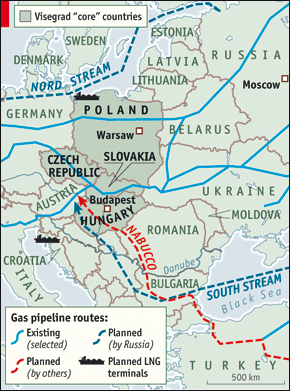 From the Economist: At a summit in Budapest on February 24th Visegrad showed signs of renewed life. The big shift is in Poland, where go-it-alone policies have given way to enthusiasm for working with the neighbours. Under the voting rules of the Nice treaty, in force until 2014, Visegrad countries have as many votes in the EU as France and Germany combined.
From the Economist: At a summit in Budapest on February 24th Visegrad showed signs of renewed life. The big shift is in Poland, where go-it-alone policies have given way to enthusiasm for working with the neighbours. Under the voting rules of the Nice treaty, in force until 2014, Visegrad countries have as many votes in the EU as France and Germany combined.
Next year Hungary and Poland will each have six months in the EU’s rotating presidency. Eurocrats in Brussels like to portray the rotating presidency as largely redundant now there is a permanent European Council president. The Poles and Hungarians are working closely together to disprove this. Hungary wants a “Danube strategy” to divert EU money and attention to the river basin. Poland supports this, in return for Hungarian backing for more EU aid to countries such as Georgia, Moldova and Belarus…
Visegrad is also pushing for EU rules on mutual help in energy crises. These could offer the region greater security. But big obstacles remain. One is Russia, which is intensifying its co-operation with friendly energy companies in France, Germany and Italy. On a trip to France, Russia’s president, Dmitry Medvedev, started formal talks on the sale of up to four Mistral-class warships, while France’s GDF Suez gained a 9% stake in the Nord Stream pipeline. (graphic: Economist)
